Before & After
Problem: Adult patient was missing her upper right canine. The space was not large enough for an implant. Two orthodontic treatment options were available: open the space to make room for an implant or close the space and have her general dentist make the first premolar look like a canine.
Treatment: Patient chose to substitute the maxillary first premolar at the canine position and have her dentist restore the first premolar (since it had a large restoration to start with).
Result: The space was closed and the first premolar was restorated to make the tooth look like the missing canine. Note, the final photo also demonstrates the uneven shape to the facial surfaces of the front teeth. The irregularity is related to the tooth shape, not their position.
| Before | After |
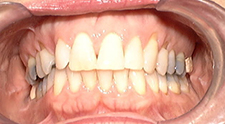 |
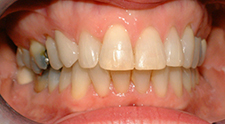 |
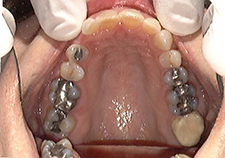 |
 |
Problem: Woman in her early 20’s presented with a retainer primary canine and an impacted canine.
Treatment: Fixed orthodontic appliances were placed on the upper arch. The primary tooth was extracted and a “gold chain” was placed by the oral surgeon. The canine was pulled down into the arch through progressive orthodontic procedures.
Result: The permanent maxillary canine was successfully pulled into the arch and became functional with the occlusion.
| Before | After |
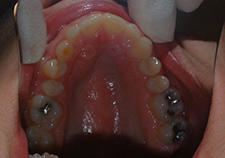 |
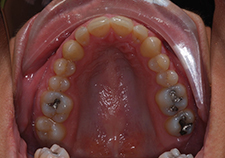 |
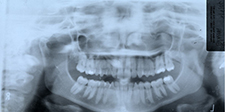 |
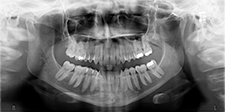 |
Problem: 6.5 year old female with early mixed dentition (adult incisors/front teeth) starting to erupt. The upper front teeth are positioned behind the lower front teeth. With this patient, the upper jaw did not develop as far forward as needed at this stage of growth and development
Treatment: Banded palatal expander, protraction face mask, night time retainer to hold the corrections
Result: The patient and her family were compliant with the face mask therapy. The upper jaw and teeth were brought forward to an age appropriate overbite. The lateral radiograph demonstrates the positive change
| Before | After |
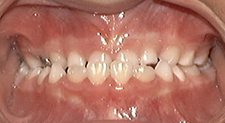 |
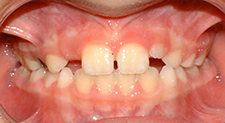 |
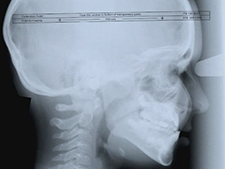 |
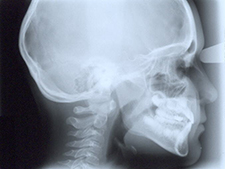 |
Problem: Patient had a dental implant placed and there was a delay in restoring the implant (placing the crown). The adjacent teeth tipped into the space where the dentist was no longer able to place the crown.
Treatment: Two braces and an upper clear retainer were made to move the teeth adjacent to the implant.
Result: The teeth were successfully moved and the implant was restored. The patient was given a night guard to help retainer the closed contacts with the implant.
| Before | Post | After |
 |
 |
 |
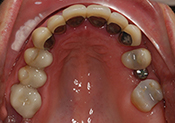 |
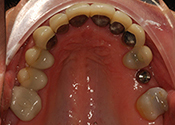 |
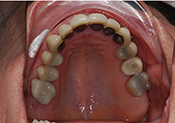 |
Problem: Patient experienced late mandibular growth. His jaw grew asymmetrically and he had left “underbite” with the front teeth (incisors).
Treatment: Full maxillary and mandibular fixed appliances, Oral surgeon performed mandibular (lower jaw) surgery to set the mandible back and Upper jaw surgery to move the maxilla (upper jaw) forward to correct the asymmetry and anterior crossbite.
Result: Patient’s asymmetric mandible was positioned better, and the maxillary incisors are positioned in front of the lower incisors. Patient had a significant improvement in his profile.
| Before | After |
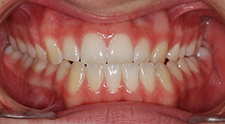 |
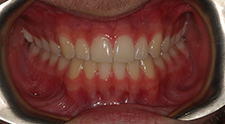 |
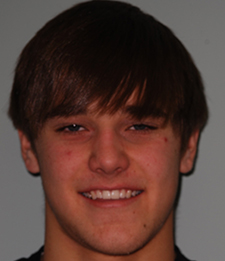 |
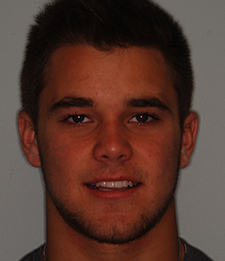 |
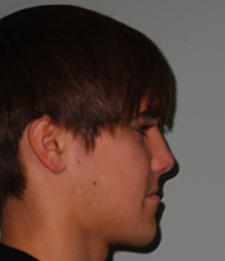 |
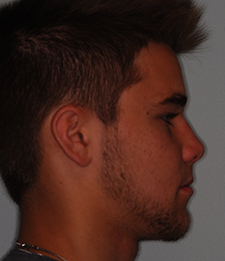 |
Problem: The patient has a horizontal impaction of her mandibular right permanent canine. Three treatment options were available: attempt to retrieve the tooth through orthodontics and oral surgery to expose the impacted tooth. Extraction of the tooth and leave space for a future implant . Extract the tooth and orthdontically close the space by moving the first premolar into the canine position.
Treatment: The impacted canine was removed. Orthodontics where accomplished to close the space where the mandibular canine was supposed to erupt.
Result: The mandibular first premolar was moved into the space and substituted for the extracted tooth. The orthodontic treatment result has been stable and the patient has no adverse occlusal factors.
| Before | After |
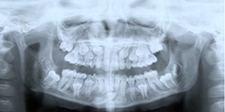 |
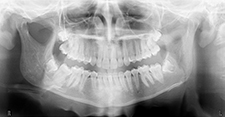 |
 |
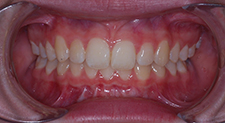 |
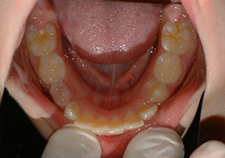 |
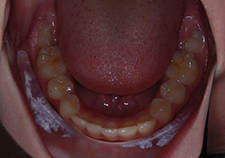 |
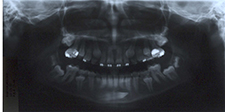 |
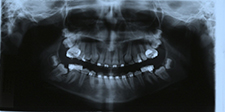 |
| 4 Years Later | |
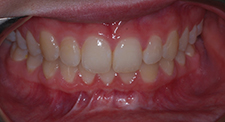 |
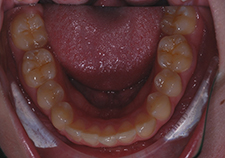 |
Problem: Patient was missing a mandibular right first molar. The adjacent teeth had tip/drifted into the missing space. These adjacent teeth had large restorations. The general dentist and patient opted to restore the missing tooth with a three unit bridge.
Treatment: Lower fixed orthodontic appliances (braces) were used to upright the teeth and close the open spacing so that the bridgework could be completed.
Result: The lower braces were successful in creating an environment where the restoring dentist could replace the missing tooth.
| Before | After |
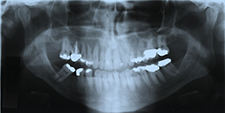 |
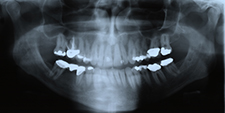 |
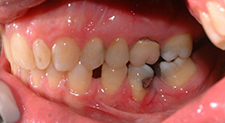 |
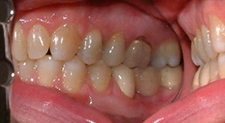 |
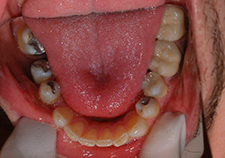 |
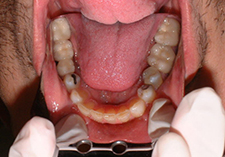 |
Problem: The patient has severe crowding to the upper and lower arches. The patient requested that no permanent teeth be removed in order to align her teeth.
Treatment: Fixed orthodontic appliances were placed with mild expansion to the dental arches. The posterior teeth (back teeth) were recontoured to make their widths smaller. The tooth size was reduced in order that all the teeth could fit within the arch length available.
Result: The teeth were successfully recontoured so that the incisors could be aligned. Note that indefinite retention is indicated in order to prevent relapse.
| Before | After | 9 Years After |
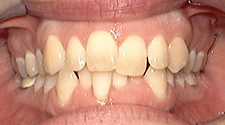 |
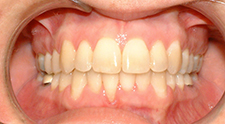 |
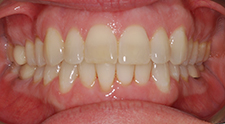 |
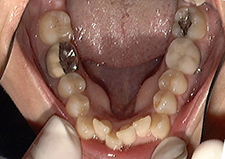 |
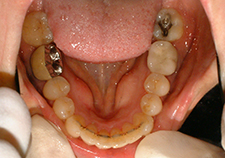 |
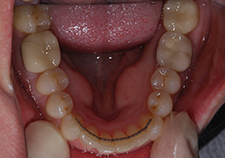 |
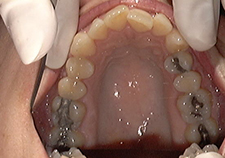 |
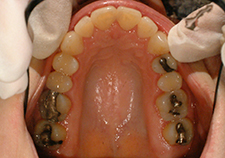 |
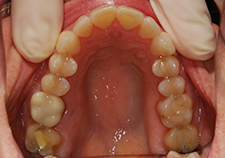 |
Problem: The patient did not like the fact that her maxillary incisors looked shorter than the rest of her front teeth.
Treatment: Fixed orthodontic appliances were place on the upper teeth. The periodontist recontoured the gingival of the lateral incisors to expose more of the clinical crown.
Result: Patient had a better anterior alignment and very good cosmetic result from her periodontal surgery.
| Before | Progress | After |
 |
 |
 |
Problem: Patient had a skeletal open bite and crowding to the mixed dentition. Her parents declined a surgical option to correct her open bite problem.
Treatment: Two phases of treatment were completed. The first phase was designed to create space for the erupting adult teeth and to attempt to keep the open bite from getting worse as the patient started puberty. Once the pubertal growth began, a second phase of treatment was accomplished to attempt to close the anterior open bite without a surgical procedure.
Result: The patient was treated in two phases to an edge to edge overbite. The patient has some function with her incisors. This is an acceptable treatment outcome in light of the fact that her bite issues were skeletal in nature. The early treatment was successful in holding the jaw growth from becoming worse so that the patient has a chance for a successful non surgical orthodontic result.
| Before | End Phase 1 |
 |
 |
| Begin Phase 2 | End Phase 2 – No Surgery |
 |
 |
Problem: The patient has crowding in both arches at age 8. This case illustrated the progression of early treatment and secondary treatment.
Treatment: Patient has early orthodontic treatment to include a palatal expander with posterior movement of the first molars, mandibular expander, upper and lower braces to the front teeth. (18 months) The patient was placed in observation for 5 ½ years. She wore upper and lower removable night time retainers over this time period.
The upper left canine did not fully erupt, the lower dentition matured with good alignment. Secondary treatment was accomplished in the upper arch for one year.
Results: early treatment (phase I) was successful in creating space and age appropriate overbite and overjet. The patient was able to mature from her mixed dentition to her adult dentition with space to accommodate her adult teeth. Secondarily, the patient received the benefit of having straight front teeth during her formative years- a psychosocial benefit to early treatment.
The fact that the maxillary left canine did not erupt fully did not indicate a failure of the efficacy of the early treatment. Without early intervention, this patients teeth would never have erupted as straight as they did without the room to accommodate the adult teeth.
Secondary treatment of the upper arch was accomplished after the third molars (wisdom teeth) were removed. The patient achieved a good esthetic and functional result.
| Before | ||
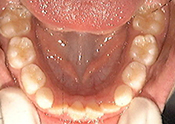 |
 |
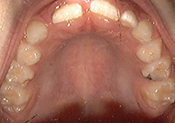 |
| Middle of Phase 1 | ||
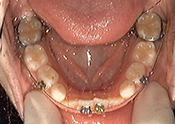 |
 |
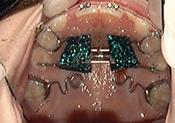 |
| End of Phase 1 | ||
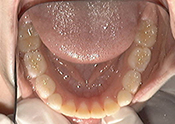 |
 |
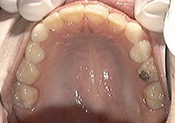 |
| 3 Years After Phase 1 | ||
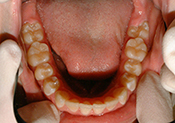 |
 |
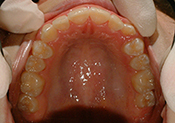 |
| 4 1/2 years after Phase 1 | ||
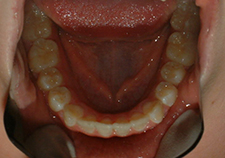 |
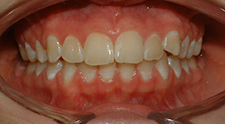 |
| End of Phase 2 | ||
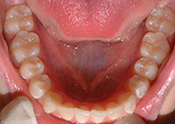 |
 |
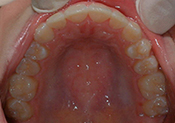 |
| Phase 2 Left | Phase 2 Right |
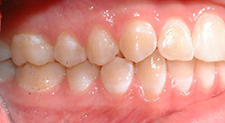 |
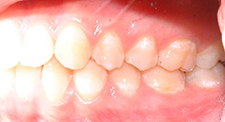 |
Problem: 8 year old female with a crossbite at her upper right central incisor. The bite is pushing the lower right incisor causing the gingival (gum) to recede
Treatment: Patient was treated comprehensively in the mixed dentition with palatal expander, mandibular fixed (cemented) expander- e-arch, braces to the upper and lower front teeth only, removable retainer
Result: The patients cross bite was corrected, the front teeth were positioned to their age appropriate position and bite. Once the pressure was removed from the gingiva- the periodontium started to normalize. Three year photos demonstrates that the rest of the adult teeth erupted without crowding and rotation into good occlusion. Note that the gingival architecture reorganized to look the same with the adjacent teeth
| Before | End Phase | 3 Years After |
 |
 |
 |
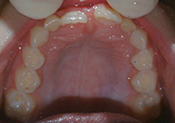 |
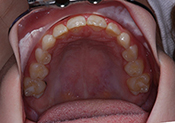 |
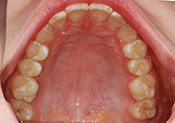 |
Problem: 8 year old presents with crowding with the maxillary and mandibular incisors, narrow arches. Panorex demonstrates the crowding of the unerupted canines and premolars.
Treatment: Patient was treated with palatal expander, fixed mandibular expander, braces to the upper and lower front teeth, upper and lower removable retainers 15 months.
Result: The early treatment was successful in aligning the upper and lower incisors, correcting the molar position(s) in the back, establishing an age appropriate overbite. The rest of the adult teeth erupted in a normal position . No secondary treatment was required . Note the panorex radiographs depicting the early crowding, the space for the unerupted permanent teeth to erupt, and finally showing that the adult teeth erupted into a good position.
Cases like this, I ask the parent, “ If your son or daughter would have never had any orthodontic treatment- would you be seeking orthodontic care at this time?”
| Before | Post | Permanent dentition erupted |
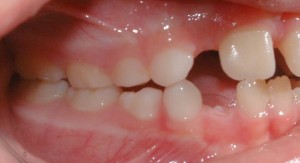 |
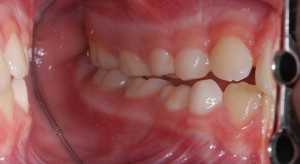 |
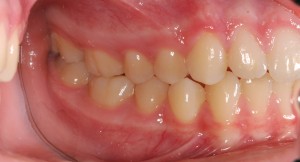 |
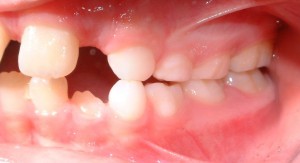 |
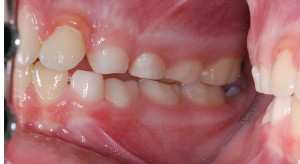 |
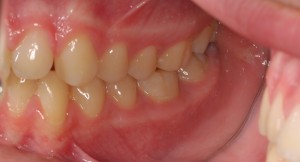 |
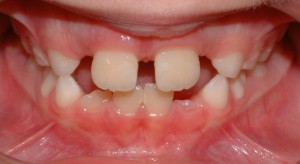 |
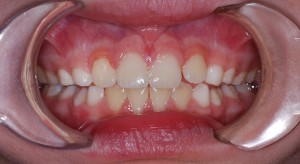 |
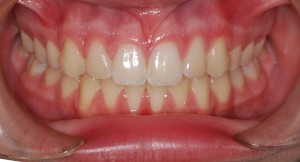 |
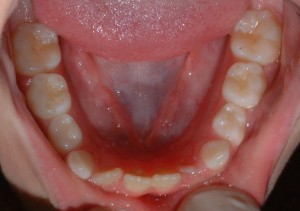 |
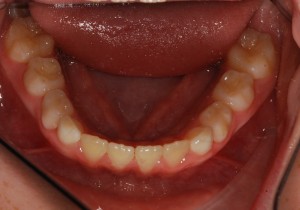 |
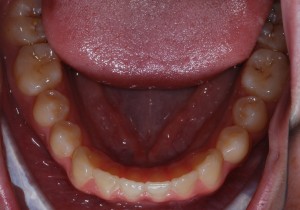 |
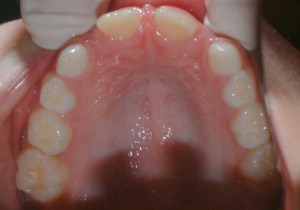 |
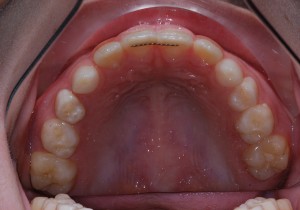 |
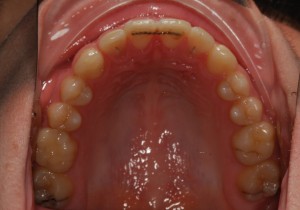 |
Problem: Adult male with crowding on both arches. There was difficulty flossing. The patient has a nice wide face and narrow dental arches.
Treatment: Patient received surgically assisted palatal expansion, full upper and lower braces, recontouring of the lower teeth as needed to relieve some of the dental crowding
Result: The patient’s crowding was resolved without extracting any permanent teeth. The patient is able to floss. He has a wider smile to match the shape of his face. I believe that the patient will have better long term periodontal health as he ages.
| Before | After |
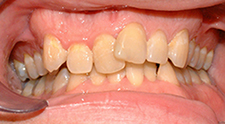 |
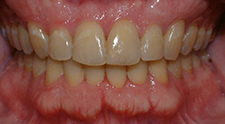 |
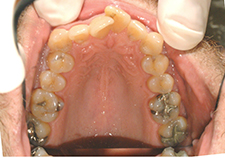 |
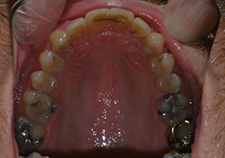 |
Problem: Patient was involved in an accident where the upper right central incisor was lost. Three treatment options were available.
- Make room for a dental implant with orthodontics. Note the implant could not be accomplished until the early 20’s.
- Create room orthodontically for a prosthesis (false tooth), noting that this would have to be replaced repeated over the course of the patients life.
- Substitute the lateral incisor for the missing central incisor and have the general dentist restore the lateral incisor to look like the other central incisor. Remember this is a trauma case where the right lateral incisor and the left central incisor were damaged and need repair.
Treatment: Fixed orthodontic appliances to the upper and lower arches. The lateral incisor was moved to the central incisor position
Result: The lateral incisor was moved to the central incisor position. The general dentist made a provisional crown on the lateral incisor to make it wider. When the patient completes his growth- definitive crowns can be placed as the gingiva will mature and the clinical crowns of these teeth will become longer
| Before | After |
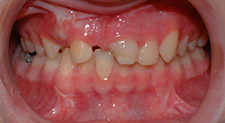 |
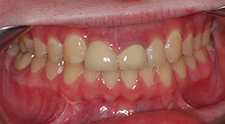 |
Problem: Patient was congenitally missing her mandibular right second premolar. The primary second molar was sunken and did not erupt with the adjacent adult teeth. Three treatment options were available
- Close the space orthodontically with no replacement of the missing tooth
- Open space up for an implant
- Open space up for resin bonded bridge.
Treatment: Fixed orthodontics to the mandibular arch where accomplished. The mandibular posterior (back) teeth were moved forward into the space.
Result: The patient initially had some residual space at the completion of her orthodontics due to smaller size of her mandibular first premolar. Seven years later with some retainer wear- the residual space has closed and the patients dentition is stable
| Post | |
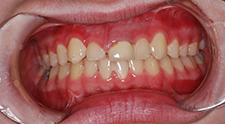 |
|
| Before | After |
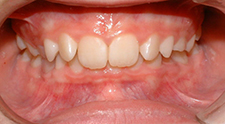 |
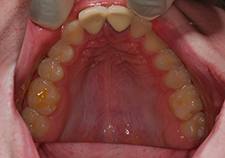 |
| 2 Years Later – Final Crowns | |
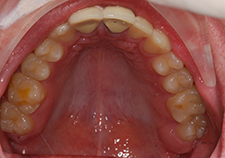 |
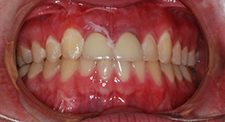 |
| Before | |
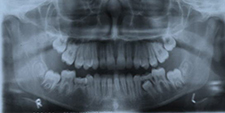 |
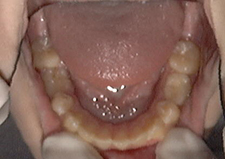 |
| Middle | |
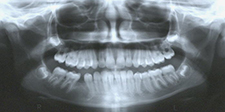 |
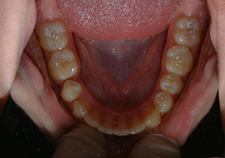 |
| After | |
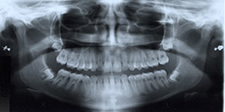 |
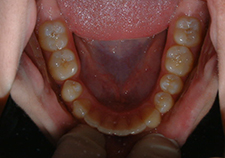 |
| 7 years later | |
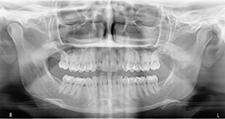 |
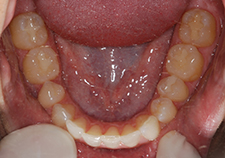 |
